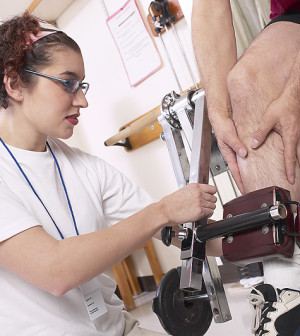- Recognizing the Signs of Hypothyroidism
- 10 Strategies to Overcome Insomnia
- Could Artificial Sweeteners Be Aging the Brain Faster?
- Techniques for Soothing Your Nervous System
- Does the Water in Your House Smell Funny? Here’s Why
- Can a Daily Dose of Apple Cider Vinegar Actually Aid Weight Loss?
- 6 Health Beverages That Can Actually Spike Your Blood Sugar
- Treatment Options for Social Anxiety Disorder
- Understanding the Connection Between Anxiety and Depression
- How Daily Prunes Can Influence Cholesterol and Inflammation
Hormone Therapy May Cut Risk of Repeat Joint Replacement Surgery in Women


Women who start hormone replacement therapy after having had hip or knee replacement surgery may cut their risk of needing another procedure in the same joint by nearly 40 percent, a new study suggests.
About 2 percent of those who have a hip or knee replacement need another surgery within three years. Most of these additional procedures are needed because of a complication known as osteolysis, which happens when tiny pieces of the implant seep into the tissue around the implant, causing inflammation that destroys the bone around the implant, the British researchers explained.
“There is evidence that drugs like hormone replacement therapy, used usually to prevent osteoporosis and fractures, might have a beneficial effect on implant survival in patients undergoing knee or hip replacement,” said lead researcher Dr. Nigel Arden, director of musculoskeletal epidemiology at the University of Oxford in England.
“These findings must be confirmed in further studies, but they are consistent with previous reports by our group showing an association between use of other drugs that have similar effects on bone and the risk of implant revision [surgery],” he said.
However, many women are nervous about taking hormone replacement therapy because of previously reported increased risks for heart disease and cancer. Since the risk of a second surgery is small, the question remains whether or not it’s worth starting hormone replacement therapy at all.
“Indeed, this is only a small added benefit of hormone replacement therapy. However, it is a relevant piece of information for women who have received a total knee or hip replacement and are considering hormone replacement therapy for menopausal symptoms,” Arden said.
The report was published online Jan. 22 in the Annals of the Rheumatic Diseases.
For the study, Arden and his colleagues collected data on more than 21,000 women who had not used hormone replacement therapy after a hip or knee replacement. The investigators compared these women with more than 3,500 women who had taken hormone replacement therapy for at least six months after surgery.
The researchers found that women who had taken hormone replacement therapy for six months after surgery were 38 percent less likely to need another surgery than those who had not.
Moreover, women who took hormone replacement therapy for a year or more after surgery were more than 50 percent less likely to need another surgery over three years of follow-up.
Taking hormone replacement therapy before joint replacement, however, didn’t make a difference in the risk for a repeat procedure, the researchers noted.
Dr. Neil Roth, an orthopedic surgeon at Lenox Hill Hospital in New York City, thinks there may be a role for drugs that help build and strengthen bone after knee and hip replacement surgeries. Based on this study, hormone replacement therapy might also be helpful, he added.
Roth noted, however, that this study only showed an association, and not a cause-and-effect link, between hormone replacement therapy and a lowered risk for another surgery.
“Right now, I wouldn’t make any changes in the way I clinically treat things based on this study, but I think it deserves further investigation,” he added.
More information
Visit the U.S. National Institute of Arthritis and Musculoskeletal and Skin Diseases for more on joint replacement surgery.
Source: HealthDay
Copyright © 2026 HealthDay. All rights reserved.










